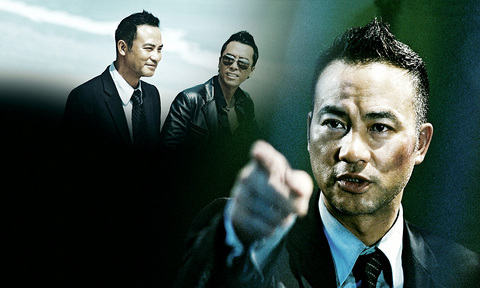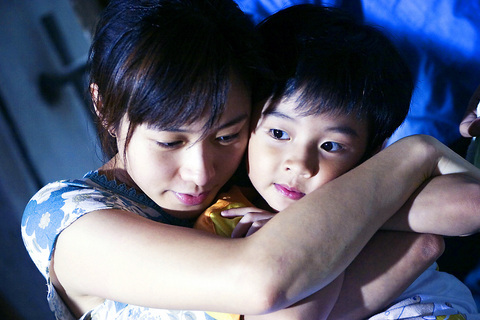Two Hong Kong films with A-list casts are slated to hit the big screen this weekend, aiming for audiences who will enjoy 90-minutes of entertainment filled with action and suspense. Sha Po Lang (殺破狼) by up-and-coming director Wilson Yip (葉偉信) is an action-packed crime drama starring kung-fu masters Donnie Yen (甄子丹) and Sammo Hung (洪金寶), while Shu Qi (舒淇) and Lin Jia-xin (林嘉欣) try out maternal roles and face the terror of losing their babies in the horror flick Home Sweet Home (怪物).
Steering away from the conventional good guy vs. bad guy format, Sha Po Lang employs a realistic approach, adding more human dimensions to the characters. Chan (played by Simon Yam (任達華)) is a senior detective leading a crime investigation police unit. He believes in putting criminals behind bars even when jailing the bad guys requires unlawful actions. On the other hand, as Chan approaches retirement, his replacement, Ma (played by Yen), is an uncompromising martial arts expert who insists on bringing down bad guys with hard evidence.
However, Ma's integrity stems from a feeling of guilt after he beat a suspect to death a few years previously.

The two work together trying to capture the underworld leader Po (played by Hung), a cold-blooded murderer but a model husband and father at home. A piece of video evidence emerges, suggesting Po murdered an undercover agent and the police move in.
To convict the underworld boss, Chan deliberately covers up evidence that proves Po's innocence and he forces the real killer to commit suicide.
Po, anxious to join his family for Father's Day, bribes high ranking officers and secures his release. Chan and Ma go to Po's home for a showdown and the ensuing bloodbath ends in a surprise denouement.

China-born martial arts actor Yen took up the role of action choreographer for the film and combined elements of various martial art forms such as judo, boxing and wrestling to create combat rich in content and forms. Without props and visual effects, all the action scenes are done with masterful martial arts moves.
An action film is likely to fall flat without the backing of a well-developed plot. This is where director Yip comes in. According to Yip, Sha, Po and Lang represent three malignant stars in ancient Chinese astrology, destruction, conflict and greed. The meeting of the three doesn't necessarily bring out evil, it can also lead to virtue. Under this premise, Yip successfully brings out the elements of drama and character development in a Hong Kong action genre often known for its one-dimensional characters and simple plots.
Home Sweet Home revolves around two female figures: a wife with a middle-class upbringing and a hysterical woman who goes mad and becomes a monster that haunts the middle-class family.
The 35-year-old May (played by Shu Qi), is a housewife whose husband and six-year-old son mean the world to her.
One day their son goes missing without a trace. May follows her maternal instincts to solve the mystery and tries to get her son back, but the clues and evidence lead her to a dark secret hidden behind the placid facade of the residential community -- a monster (played by Lin) dwells in the same community and kidnapped May's son.
Lin's performance and the abhorrent appearance of the monster contribute significantly to the suspense and thrill of the film. Lin's monstrous image was done by make-up artist Mark Garbarino, who has proved his masterful skills in TV series Six Feet Under and Hollywood movies including AI Artificial Intelligence and Mission Impossible 2. The latest Golden-Horse best leading actress Shu Qi also makes a smooth transit from her usual on-screen persona as a sexy young women to a down-to-earth mother confronting the fear of losing her son and the breakdown of her family.

That US assistance was a model for Taiwan’s spectacular development success was early recognized by policymakers and analysts. In a report to the US Congress for the fiscal year 1962, former President John F. Kennedy noted Taiwan’s “rapid economic growth,” was “producing a substantial net gain in living.” Kennedy had a stake in Taiwan’s achievements and the US’ official development assistance (ODA) in general: In September 1961, his entreaty to make the 1960s a “decade of development,” and an accompanying proposal for dedicated legislation to this end, had been formalized by congressional passage of the Foreign Assistance Act. Two

Despite the intense sunshine, we were hardly breaking a sweat as we cruised along the flat, dedicated bike lane, well protected from the heat by a canopy of trees. The electric assist on the bikes likely made a difference, too. Far removed from the bustle and noise of the Taichung traffic, we admired the serene rural scenery, making our way over rivers, alongside rice paddies and through pear orchards. Our route for the day covered two bike paths that connect in Fengyuan District (豐原) and are best done together. The Hou-Feng Bike Path (后豐鐵馬道) runs southward from Houli District (后里) while the

March 31 to April 6 On May 13, 1950, National Taiwan University Hospital otolaryngologist Su You-peng (蘇友鵬) was summoned to the director’s office. He thought someone had complained about him practicing the violin at night, but when he entered the room, he knew something was terribly wrong. He saw several burly men who appeared to be government secret agents, and three other resident doctors: internist Hsu Chiang (許強), dermatologist Hu Pao-chen (胡寶珍) and ophthalmologist Hu Hsin-lin (胡鑫麟). They were handcuffed, herded onto two jeeps and taken to the Secrecy Bureau (保密局) for questioning. Su was still in his doctor’s robes at

Mirror mirror on the wall, what’s the fairest Disney live-action remake of them all? Wait, mirror. Hold on a second. Maybe choosing from the likes of Alice in Wonderland (2010), Mulan (2020) and The Lion King (2019) isn’t such a good idea. Mirror, on second thought, what’s on Netflix? Even the most devoted fans would have to acknowledge that these have not been the most illustrious illustrations of Disney magic. At their best (Pete’s Dragon? Cinderella?) they breathe life into old classics that could use a little updating. At their worst, well, blue Will Smith. Given the rapacious rate of remakes in modern